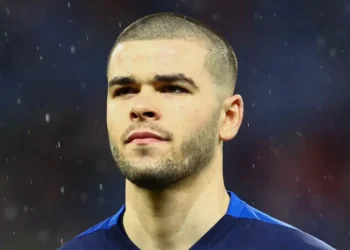Raúl Jiménez, the Mexican international and one of his nation’s most recognizable football stars, delivered a poignant moment at the Gold Cup final ceremony that transcended the celebrations on the pitch. In a gesture that caught fans and cameras alike, Jiménez paid tribute to his close friend and former Wolverhampton Wanderers teammate Diogo Jota by wearing a shirt emblazoned with the number 20 — a number synonymous with the Portuguese forward throughout much of his club career.
The sight of Jiménez stepping onto the podium after Mexico’s hard-fought victory was already an emotional moment for many supporters. But the tribute to Jota brought an extra layer of sentiment that resonated far beyond the final whistle. For many, it was a reminder that football is about more than trophies and goals — it is also about the bonds that players forge, the brotherhood within the dressing room, and the moments of solidarity that unite the sport’s global community.
Jiménez and Jota’s friendship was born during their overlapping years at Wolves. Together, they formed one of the Premier League’s most exciting attacking partnerships between 2018 and 2020. Their chemistry on the pitch was evident to anyone who watched Wolves’ improbable rise under then-manager Nuno Espírito Santo. Off the pitch, they were often seen joking during training sessions, sharing dinners with teammates, and supporting each other through the highs and lows of a demanding league.
While Jota eventually moved to Liverpool, where he continued to thrive and became a key figure in Jürgen Klopp’s squad, the bond between the two players remained intact. They stayed in touch, exchanging messages of support — especially during Jiménez’s harrowing recovery from the skull fracture he suffered in 2020, which sidelined him for months and threatened to end his career. Jota was among the first to send public words of encouragement at the time, showing that their friendship extended far beyond Molineux Stadium.
The decision to honour Jota at the Gold Cup final carried extra weight given the difficult weeks that Jota has endured recently. While details surrounding Jota’s situation have been kept relatively private by his family and club, there have been reports suggesting that the Portuguese star has been dealing with personal challenges off the pitch. Jiménez’s tribute, therefore, felt like a quiet but powerful message of solidarity and respect.
The number 20 has always held special meaning for Jota. It was his number during his breakout years at Wolves and one he carried forward to Liverpool, where he has worn it with distinction in some of the club’s most significant matches, including Champions League ties and Premier League title chases. For Jiménez to don that number at the crowning moment of his national team’s campaign sent a clear message: no matter where their careers take them, the bond remains unbroken.
The image of Jiménez raising his arms, draped in the Mexican flag, with the number 20 visible on his shirt, quickly went viral on social media. Fans of both Wolves and Liverpool flooded timelines with tributes of their own, praising the Mexican striker not just for his performance on the pitch but for his character and loyalty off it. Many praised the gesture as a reminder of the human side of the game, often overshadowed by transfer rumours, contract disputes, and the relentless demands of modern football.
Football is full of rivalries, but it is also full of moments that remind us of its capacity to connect people across countries, languages, and clubs. For Mexican fans, Jiménez’s tribute was another reason to celebrate their hero. For Wolves and Liverpool supporters, it was a reminder that once a player leaves the club, the connections they built often endure long after the final whistle.
As the confetti fell and the Gold Cup was lifted high, Jiménez’s gesture lingered in the minds of many — a quiet tribute, a message of friendship, and a testament to the deep ties that make football not just a game, but a family. For Raúl Jiménez and Diogo Jota, it was a simple but powerful reminder that, no matter the colours they wear or the stadiums they call home, some bonds remain stronger than any scoreline.
In an era where footballers are often scrutinized for every move, this heartfelt moment offered a glimpse of what makes the sport special: loyalty, brotherhood, and respect. Jiménez showed that while goals and trophies define a career, gestures like th
is define a legacy.











